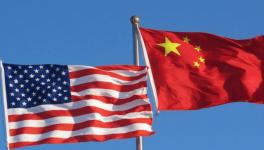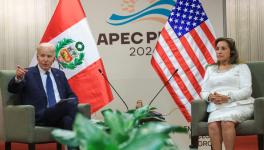Part II - 'Notwithstanding geopolitics, differences; Democracy- an Imperative in Central/West Asia"
Part II of Newclick's interview with Prof. Anuradha Chenoy of the Centre for Russian and Central Asian Studies, SIS, JNU, on developments in Central Asia, as a pro-democracy uprising wave is in progress in West Asia.
Srinivasan Ramani (SR): let's talk about the geo politics itself. In regimes in nations like Egypt and Tunisia, for example, apart from anger against authoritarianism, there is also anger with the kind of policies that are being followed by the regimes, in terms of strategic closeness with Israel and also closeness with the United States. And that's true of the protest in Yemen, in Bahrain and in other places as well. What exactly there is the geo politics in Central Asia? We know that Russia still has a domineering influence over there. But also we keep reading about the Americans wanting a military base in Uzbekistan and Turkmenistan being pretty close ally of the United States. So what's really happening in the Geopolitics of the region?
Anuradha Chenoy (AC): Well, geo politics here is extremely critical, because all these central Asian states are located in such a region that they are geopolitically sensitive. They are bordering on Afghanistan, bordering on West Asia, border on Russian, border on China and Border on Pakistan. So it is a very hot zone, as they call it. But at the same time, the geopolitics of the great powers is to try to manipulate these countries. So external geopolitics impacts their internal politics. On the one side, there is the geopolitics of US, who wants and has bases in Kyrgyzstan, Tajikistan; they had an arrangement with Uzbekistan and Turkmenistan earlier. Turkmenistan tried to be very neutral between Russia and the US, so that they could use them whenever they could be useful. But when there were these colour revolutions, they became closer to Russia because their regime's policy suits the Russian policy. They don't want an intervention, they don't want any democracy movement, which they say is sponsored by Soros foundation and West and they say all these democracy movements are western NGO sponsored. So again they have joined the Shanghai corporation organisation, the collective security treaty organisation. They say they want to be part of CIS peace keeping etc., but again, Russia also has a geo politics, where they say, ‘Central Asia- that's our zone of influence. We don't want the Chinese or the Americans there.’ All these countries are balancing each other. China wants its influence but its economic influence and Russia and China do not intervene in regime politic, which the US does. So Russia and China will not encourage democracy movements. They will have economic agreements, oil, pipe lines etc., whereas America always has an issue of human rights.
So there is this kind of geopolitics, in which Pakistan and India are also minor players; wherein India has very good relations with all the central Asian countries. They have cultural centres there. They are getting uranium from Kazakhstan. They are getting energy from other places. And they have also lot of goodwill because they also do not intervening in the internal politics. Their argument is- only by example. India is a democracy and they can follow it if they want to. We are not going to support the democracy movements like Americans do. There is this kind of geopolitics. Afghanistan, specially, has an impact, because of the routes which the western military, NATO, AISAF can use because the Pakistan routes are very unsafe and here Russians are also supporting it, because they want a stable Afghanistan. Earlier, from Afghanistan, there were two problems, the spill over of the Afghan conflict. One was the spill over of the fundamentalist Islam, links with the Al Qaeda militants in the north caucuses, Chechen fighters, right from Kashmir to the FATA- they were all linked. They are all literally driving distances; and the other problem was drugs trafficking and the third was trafficking in women. Due to this drug trafficking through central Asia into Russia, thirty thousand Russians are dying of drug related abuse. So that is a major problem and they want to see an end to that. They feel that the western alliance is not putting in enough effort and only focusing on the military and not focusing on the human security aspect and Central Asians are equally concerned about that.
SR: Even China is also slightly concerned.
AC: China is concerned because of the political Islam possibility and the linkages which they have.
SR: In places like Egypt and Tunisia, especially in Egypt, the popular opposition has been represented by the Muslim Brotherhood. In Bahrain and Yemen, the subtext of the protests, in Bahrain specifically, is that this is a Shia uprising against the authoritarianism Sunni royal hood. There is an Islamic subtext to the protest, even if it is not pronounced. How about Islamisation in central Asian republics? Is there any Islamic current per se? How it is acting? Are they organising opposition groups against the authoritarianism nationalist regime that have been in place now?
AC: It's a very important question for two reasons. One is that there are lot of myths around it and the second is that there is a lot of truth around it also, because wherever there is more repression, who is leading movements against the repression- the local mosques. If you have repression, there is one structured opposition and that is coming from religion and political Islam, because no political parties are allowed. These are secular regimes now. It's a fall back from the Soviet period. Of course, mosques are allowed, but at the same time, in the central Asia, mosques have had a very limited role because the central Asian societies are highly secularised, especially as evident amongst women. This Islamic culture is very new to them. But because of repression, anyone who is anti-state has only one place to go to, which is to link up with the mosques and the political Islam. Not all mosques are political but some definitely are. But they definitely oppose repression and they see themselves as an alternate because they are also in a game for political power.
They are saying, ‘they are secular as well as despotic; we are religious and though we may not give you freedom, we promise you paradise. So come to us.’ So that is the kind of link. It is a spiral which can go around and to stop it, democratic movements are important. It's important to have political space for political parties whatever their ideology, rather than allow the mosque to become the only opposition and that is what has happened in some of the places, especially Turkmenistan and Uzbekistan, where there are these movements. There is a Pan- Turkic movement, which wants a unified Central Asia under Turkic rule. Then there is an Islamic movement of Uzbekistan, which is underground, but is opposing Niyozov and other regimes and has been doing so for a long time.
So the opposition is coming from there and that is where it is dangerous and it can link up with Al Qaeda or link up with the Chechen rebels, especially with north Caucuses fundamentalists and political Islam movements. Like there is this person who calls himself the Emir of Caucasus. So there are these terror strikes, in the Caucuses; one every day.
SR: So, in a sense, you are saying that even though there are cultural specificities and there are geopolitical differences vis-a-vis West Asia and Central Asia, democracy is imperative.
AC: Democracy is imperative. They must give the people democratic space; otherwise if not now may be in ten years there would be some kind of regime change. People are not going to [put up with it]. Of course, independence came to them in a platter. They didn't have a movement like they did in the breakup of the Soviet Union. But democracy is a bug which travels very fast and the younger generation cannot wait.
Get the latest reports & analysis with people's perspective on Protests, movements & deep analytical videos, discussions of the current affairs in your Telegram app. Subscribe to NewsClick's Telegram channel & get Real-Time updates on stories, as they get published on our website.























